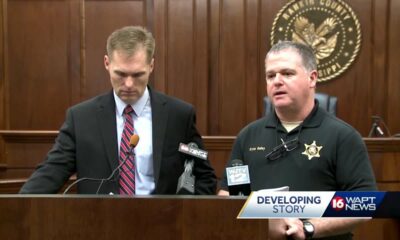Mississippi Today
Lawmakers may have to return to Capitol May 14 to override Gov. Tate Reeves’ potential vetoes
Legislators might not have much notice on whether they will be called back to the Mississippi Capitol for one final day of the 2024 session.
Speaker Jason White, who presides over the House, and Lt. Gov. Delbert Hosemann, who presides over the Senate, must decide in the coming days whether to reconvene the Legislature for one final day in the 2024 session on Tuesday at 1 p.m.
Lawmakers left Jackson on May 4. But under the joint resolution passed during the final days of the session, legislators gave themselves the option to return on May 14 unless Hosemann and White “jointly determine that it is not necessary to reconvene.”
The reason for the possible return on Tuesday presumably is to give the Legislature the opportunity to take up and try to override any veto by Gov. Tate Reeves. The only problem is the final bills passed by the Legislature — more than 30 — are not due action by Reeves until Monday, May 13. And technically the governor has until midnight Monday to veto or sign the bills into law or allow them to become law without his signature.
Spokespeople for both Hosemann and White say the governor has committed to taking action on that final batch of bills by Monday at 5 p.m.
“The governor's office has assured us that we will receive final word on all bills by Monday at 5 p.m.,” a spokesperson for Hosemann said. “In the meantime, we are reminding senators of the possibility of return on Tuesday.”
A spokesperson for White said, “Both the House and Senate expect to have all bills returned from the governor before 5 p.m. on Monday. The lieutenant governor and speaker will then decide if there is a reason to come back on May 14.”
The governor has five days to act on bills after he receives them while legislators are in session, which technically they still are. The final batch of bills were ready for the governor's office one day before they were picked up by Reeves staff. If they had been picked up that day earlier, Reeves would have had to act on them by Saturday.
At times, the governor has avoided picking up the bills. For instance, reporters witnessed the legislative staff attempt to deliver a batch of bills to the governor's Capitol office one day last week, but Reeves' staff refused to accept the bills. They were picked up one day later by the governor's staff, though.
Among the bills due Monday is the massive bill that funds various projects throughout the state, such as tourism projects and infrastructure projects. In total, there are more than 325 such projects totaling more than $225 million in the bill.
In the past, the governor has vetoed some of those projects.
The governor already has taken action of multiple bills passed during the final days of the session.
He allowed a bill to strip some of the power of the Public Employees Retirement System Board to become law without his signature. The bill also committed to providing a 2-and-one-half percent increase in the amount governmental entities contribute to the public employee pension plan over a five year period.
A bill expanding the area within the Capitol Complex Improvement District, located in the city of Jackson, also became law without his signature. The CCID receives additional funding from the state for infrastructure projects. A state Capitol Police Force has primary law enforcement jurisdiction in the area.
The governor signed into law earlier this week legislation replacing the long-standing Mississippi Adequate Education Program, which has been the mechanism to send state funds to local schools for their basis operation.
This article first appeared on Mississippi Today and is republished here under a Creative Commons license.
Mississippi Today
A company wanted to store carbon under US forests. It may get its wish.
After it was twice denied permission to store carbon dioxide under U.S. Forest Service lands, a company looking to store millions of tons of the greenhouse gas in the Southeast made a strategic decision: Keep pushing.
The company, CapturePoint Solutions, leased property adjacent to forest service land in Mississippi for a project there. It started a program teaching carbon management at a school system near Forest Service land in Louisiana. And then, more than a year after it received its first denial, CapturePoint invited federal officials on an informational tour to discuss storing carbon under forest service land.
USFS officials are now considering a draft rule to allow carbon capture under U.S-owned land. The agency insists the company's requests did not influence its decision to draft the rule — and that no one from the Forest Service attended the informational tour.
“We always felt and believed that the Forest Service was not following (Federal Land Policy and Management Act), and therefore continued our efforts,” said a CapturePoint spokesperson who asked not to be named.
That law allows some federal lands to be used for energy, including gas. Environmental groups argue the 1976 law does not cover carbon dioxide storage. They are concerned that CO2 could leak from the ground, injuring or killing people and animals and damaging the forest. Injecting the carbon underground, they say, amounts to an industrialization of federal land.
While it is technically possible for such a leak to occur, the chances of a leak from storage areas more than a mile underground are “extremely remote,” CapturePoint CEO Tracy Evans told Floodlight.

Agency records reveal various requests
CapturePoint's efforts were detailed in public records obtained from the Forest Service by CURE, a Minnesota-based nonprofit, and shared with Floodlight. CURE is opposed to carbon pipelines in Minnesota and is concerned about carbon storage under Forest Service land in its state. The records also reveal inquiries in 2022 by ExxonMobil to stash carbon under the Sam Houston National Forest in Texas.
The Carbon Capture Coalition says the United States won't be able to meet 2050 greenhouse gas reduction targets unless it allows federal land to be used for carbon storage. The pro-carbon capture coalition of more than 100 companies, unions, conservation and environmental policy organizations estimates about 130 million acres of federal lands overlay suitable geology for the secure storage of captured carbon dioxide. The Forest Service manages 21% of that land.
CapturePoint applied to inject carbon under the Kisatchie National Forest in central Louisiana in 2021 under its previous corporate name, Authentic Reductions. CapturePoint also applied to inject carbon under the Delta National Forest in Mississippi in 2022.
The applications were rejected for the same reason — such a permit would allow a permanent use of Forest Service land, something the agency has historically not allowed.

New carbon capture rule on tap
Now, more than three years after the company began its push, the Forest Service is in the middle of changes that could allow the storage of the greenhouse gas under millions of acres of Forest Service land indefinitely.
The comment period for the draft rule ended in January. The Forest Service is currently reviewing the comments, agency spokesperson Catherine McRae said.
Both CapturePoint and the Forest Service agree: No agency employees ended up attending the tour the company held of the Kisatchie and Delta forests in 2022. CapturePoint said it had no direct input on the creation of the draft rules. And McRae said the company's requests did not prompt the Forest Service to propose the draft rule.
The email correspondence in the records obtained by CURE included draft applications from CapturePoint to inject carbon under the two forests. In both, CapturePoint offered $1 per ton of injected carbon. In the Kisatchie National Forest, CapturePoint proposed injecting up to 50 million tons over a 12- to 20-year period — which it said is equivalent to removing the emissions from 10 million cars a year. In the Delta forest, the company said it wanted to inject 6-12 million tons over 12 years.
The Inflation Reduction Act offers companies that capture and store carbon dioxide from $60 to $180 per ton in tax credits. Evans told Floodlight $1 per ton was offered when subsidies were lower, but there are mechanisms in place to increase the payments if subdies increased.
“Some of the lobbying was sort of surprising,” said Hudson Kingston, legal director of CURE. He said the company “sucked up to” federal employees by offering to take them on the tour. “It's how regulatory capture works.”
Victoria Bogdan Tejeda, an attorney with the Center for Biological Diversity, had a similar reaction.
“One could really infer that there was a lot of industry pressure or influence to try to get access to this pore (underground) space,” Bogdan Tejeda said. “And that, so far, they were successful, at least with getting a rule out there that would make their applications possible.”
CapturePoint doesn't see it that way. Evans argued that storing carbon under Forest Service and other federal lands makes sense given the federal government's “desire to have CCS move forward.”

(USDA Forest Service photo by Preston Keres) Credit: Preston Keres / U.S. Forest Service
Feds already allow some carbon storage
In addition to approaching the Forest Service, CapturePoint also inquired about storing carbon under a U.S. Army base in central Louisiana, he said.
Some federal agencies, including the Bureau of Land Management, already allow carbon to be stored under their lands under the federal land management law. In 2022, the BLM granted its first approval to ExxonMobil to permanently store carbon under land in Wyoming, a project that remains controversial.
While CapturePoint says the law should also apply to the Forest Service, Bogdan Tejeda said it's not that straightforward. The law does not mention carbon dioxide or permanent storage, and historically, the Forest Service has interpreted its own authority as barring any permanent use, she said.
November's draft rule by the Forest Service surprised many agency observers, who say it bucks precedent. While there are leases on Forest Service for oil and gas drilling, for instance, those leases are for a set number of years, not for a permanent use, Bogdan Tejeda said.
“I'm not seeing anything in the rule that they (USFS) issued, showing why that would change,” she said.
Among the concerns over storing carbon under forest service land is the potential to endanger tribes' access to fish and other food, which the federal government agreed to protect in exchange for seizing vast tracts of Native American land, according to the Confederated Tribes of the Umatilla Indian Reservation in Oregon.

Bogdan Tejeda still has a lot of questions, including who will monitor the stored carbon after CapturePoint is gone — and who will be liable if something goes wrong.
“It gives industry essentially a place to dump their carbon dioxide waste, benefit from the tax credits, and they don't have to deal with the messiness of trying to get permission from property owners and eminent domain.”
The federal government says, ‘Hey, just come on over here,' ” she said, “and that's a form of a subsidy.”
Floodlight is a nonprofit newsroom that partners with local and national outlets to investigate the powerful interests stalling climate action.
This article first appeared on Mississippi Today and is republished here under a Creative Commons license.
Mississippi Today
Let the Olympics begin, but nothing will top what Ruthie Bolton did in 1996

The opening ceremonies of the Summer Olympics are tonight in Paris, and my thoughts immediately go back to the only time I covered the Olympic Games, 1996 in Atlanta.
My first thought: Has it really been 28 years?

Yes, it has, but in so many ways it seems as if it were only last week. It remains one of the highlights of my more than half century writing about sports. The memories are vivid, poignant and many. There was Muhammad Ali lighting the Olympic flame with trembling hands. There was then-Hattiesburg resident Angel Martino, a swimmer, winning the first American medal and then three more. There was the bomb that went off in Centennial Park, adjacent to Olympic headquarters, putting a 24-hour hold on the Olympics and causing this sports writer to work a 36-hour shift. There were Skip Bertman and Ron Polk coaching Team USA baseball, puffing on huge Honduran cigars all the while. There was a human blur named Michael Johnson who shattered records in the 200- and 400-meter sprints. There was all that and so much more.
Most memorable of all, there was Ruthie Bolton and, by extension, the Rev. Linwood Bolton, Ruthie's daddy. For me, they became the best story of those Olympic Games and gave this Mississippi reporter more than he ever dreamed he could write home about. You could not make their story up.
Ruthie, from the tiny south Mississippi town of McLain, was the point guard for the gold medal-winning USA women's basketball team that pretty much stole the Olympic spotlight from Michael Jordan, Charles Barkley and the USA men's Dream Team. The American women also included such stars as Lisa Leslie, Sheryl Swoopes and Rebecca Lobo, but little Ruthie Bolton was the team's engine. She made them go, both offensively and defensively. Her story was fascinating and as Mississippi as it gets.
Start with this: Ruthie was the smallest of the 20 children born to the Rev. Linwood Bolton and his wife, Leola, who lived on a farm near McLain in Greene County, 34 miles south of Hattiesburg. Leola Bolton had died of cancer the year before the Olympics. Linwood, who at the age of 73 still pastored four south Mississippi churches, watched the first week or so at home on TV, then came to Atlanta for the last week of the games. Meeting and interviewing him was a highlight. He had lost the love of his life and much of his hearing, but his handshake was firm and he still possessed the sunny, effervescent personality of a much younger man.

“Yes,” he answered, he was “mighty, mighty proud of Ruthie. The rest of them are bigger, but little Ruthie was a little different from the rest,” Rev. Bolton said. “She was the quiet one, but she had a fire inside. Ruthie was the fighter. She was always so determined. When she had a goal, nothing was going to stand in the way.”
On the Bolton farm, the family grew corn, peas, beens, greens, okra and tomatoes. They raised cattle, hogs and chickens. Everyone pitched in with the chores, and, said Linwood, Ruthie always chose the most difficult work of all.
All that hard work on the farm somehow translated to the basketball court. For Team USA, Ruthie always got the most difficult defensive assignment. She nearly always defended the other team's best player and she led the team in steals. Offensively, she ran the show, scoring 13 points a game and leading the team in assists.
In the championship game against Brazil, played before 33,000 in the Georgia Dome, Ruthie scored 15 points, passed out five assists and made five steals. On Team USA's first offensive possession, she swished a 3-pointer from four steps beyond the 3-point line. More importantly, she was given the assignment of covering “Magic Paula” Silva, Brazil's legendary star, who scored only seven points and made her only field goal when Ruthie was taking a breather.
Afterward, I asked Ruthie how she did it. Her answer: “I was in her pants, that's how. I was all over her. If she had gone to the bathroom, I was going with her.”
It reached the point where a Mississippi sports writer – covering a Mississippi woman in the biggest sporting event in the world – felt sorry for the star player from Brazil.
The medal presentation afterward was one never to be forgotten. There was Rev. Linwood Bolton, holding up a photo of his deceased wife, while his daughter, watching, smiled through tears, a gold medal draped around her neck while the Star Spangled Banner played. Again, you couldn't make this up.
Over the next couple weeks, many compelling Olympic stories will unfold on the courts, fields and in the pools of Gay Paree. None will be more compelling than what happened 28 years ago when Ruthie Bolton, the 16th of 20 born to Linwood and Leola Bolton, displayed more grit and will than imaginable.
The rest of the story? Rev. Bolton died in 1998. Ruthie went on to play the first seven seasons of the WNBA's existence, was a two-time all-star and has been inducted into both the Women's Basketball Hall of Fame and the Mississippi Sports Hall of Fame. She has long since retired and recently has moved back to McLain where her daughter, Hope, will play basketball as a ninth grader this next season.
And Ruthie's best memories of those Atlanta Olympics?
“On the floor, it had to be guarding that girl from Brazil in the gold medal game,” Ruthie told me. “Off the floor, just being supported by my family, all of them. I mean, have you ever gone into an Atlanta restaurant and asked for a table for 28?”
This article first appeared on Mississippi Today and is republished here under a Creative Commons license.
Did you miss our previous article…
https://www.biloxinewsevents.com/?p=378381
Mississippi Today
On this day in 1948
JULY 26, 1948

President Harry Truman issued Executive Order 9981, which abolished racial discrimination in the United States Armed Forces, eventually leading to segregation's end in the services. The order came after he saw many returning Black soldiers become victims of violence.
“My stomach turned over when I learned that Negro soldiers, just back from overseas, were being dumped out of army trucks in Mississippi and beaten,” he said. “I shall fight to end evils like this.”
He formed the President's Committee on Civil Rights, which asked for an end to discrimination in the armed forces, and later said in a speech at the Lincoln Memorial, “We have reached a turning point in the long history of our country's efforts to guarantee freedom and equality to all of our citizens.”
Throughout the early history of the U.S. military, minorities had been segregated into separate units. Often given menial tasks, they rarely saw combat. But when they had been allowed to fight on the battlefield, they had proven their patriotism and their mettle. Many of the military brass resisted the change, and the last segregated units didn't disband until 1954. Exactly 15 years later, Defense Secretary Robert McNamara instructed military commanders to boycott private facilities used by soldiers or their families that discriminated against Black Americans.
This article first appeared on Mississippi Today and is republished here under a Creative Commons license.
-
Mississippi News5 days ago
Columbus woman accused of nearly running over law enforcement – Home – WCBI TV
-
Mississippi News6 days ago
OCSD warns of a scam circling the area
-
Mississippi News5 days ago
Suspect wanted after man killed in South Jackson
-
Mississippi News6 days ago
Fulton teen dies following a traffic accident in Alabama
-
Mississippi News6 days ago
Local hair salon gives away free bookbags
-
Our Mississippi Home7 days ago
Fiddler Crabs Love to Wave
-
Mississippi News6 days ago
Starkville teen faces list of charges in connection to auto burglaries
-
News from the South - Georgia News Feed5 days ago
Atlanta mother found dead in back of car

































